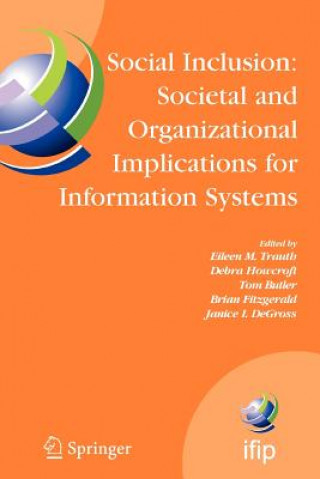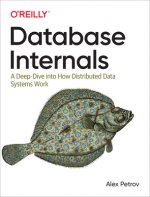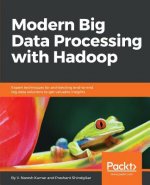
Kód: 01422692
Social Inclusion: Societal and Organizational Implications for Information Systems
Autor Eileen Trauth, Debra Howcroft, Tom Butler, Brian Fitzgerald
Changes in society resulting from the pervasiveness of information technology have produced positive and negative, intended and unintended consequences. Key among them is the exclusion of individuals who lack access to technologic ... celý popis
- Jazyk:
 Angličtina
Angličtina - Vazba: Brožovaná
- Počet stran: 420
Nakladatelství: Springer, Berlin, 2011
- Více informací o knize

3313 Kč

Skladem u dodavatele v malém množství
Odesíláme za 12-15 dnů
Potřebujete více kusů?Máte-li zájem o více kusů, prověřte, prosím, nejprve dostupnost titulu na naši zákaznické podpoře.
Přidat mezi přání
Mohlo by se vám také líbit
-

Effects of Cross and Self Fertilisation in the Vegetable Kingdom
1671 Kč -

Theatre of Suzuki Tadashi
3752 Kč -

Transforming Childcare and Listening to Families
396 Kč -

Philosophy of Psychology
1205 Kč -

Etapas:: 11 Libro del profesor
332 Kč -

Making Waves, Revised and Expanded
1373 Kč -

Echocardiography in Adult Congenital Heart Disease
4471 Kč -

Das Prinzip Menschenwurde
2603 Kč -

Hauteville House - Reiseziel Tulum
354 Kč -

Erziehung, Bildung, Berufsberatung, Ausbildung und psychische Gesundung
1125 Kč -

Tod in Innsbruck
318 Kč -

Tausenderlei uber die Liebe
476 Kč -

Mercedes-Benz R/C 107
410 Kč -

Das Gesetz der Anziehung
262 Kč -

Ich schreibe, um herauszufinden, was ich denke
710 Kč -

Strafgerichtliche Öffentlichkeit und öffentlicher Ankläger in der französischen Aufklärung, mit einem Ausblick auf die Gesetzgebung der Konstituante.
1982 Kč -

Strukturwirkungen des Inflationsprozesses.
421 Kč -

Matematika pro netechnické obory SOŠ a SOU 1.díl
198 Kč -

Schreib richtig! Arbeitsheft 2
350 Kč -

Doktor Faustus
1174 Kč -

Tinto 1 - Grüne JÜL-Ausgabe - 1. Schuljahr
581 Kč
Dárkový poukaz: Radost zaručena
- Darujte poukaz v libovolné hodnotě a my se postaráme o zbytek.
- Poukaz se vztahuje na celou naši nabídku.
- Elektronický poukaz vytisknete z e-mailu a můžete ihned darovat.
- Platnost poukazu je 12 měsíců od data vystavení.
Více informací o knize Social Inclusion: Societal and Organizational Implications for Information Systems
Nákupem získáte 331 bodů
 Anotace knihy
Anotace knihy
Changes in society resulting from the pervasiveness of information technology have produced positive and negative, intended and unintended consequences. Key among them is the exclusion of individuals who lack access to technological resources from various societal processes and services. The theme of this book, social inclusion, explores the many dimensions of this exclusion. This issue has been the focus of much debate within the social sciences, yet has largely been underresearched in the Information Systems field, despite our concerns with the social and organizational aspects of technology. To the extent that contemporary debates have identified access to information as a key component of poverty, digital exclusion is seen as the problem. Thus, ICTs are portrayed as either exacerbating exclusion or are presented as the solution for greater inclusion. This conference will provide us with the opportunity to build upon our strong tradition of studying technology design and use in organizations, and expand our field of enquiry to consider the processes that engender social exclusion and the issues that derive from it. §This theme invites consideration of social and organizational constraints that result in the underrepresentation of certain groups and, by implication, certain issues. Likewise, it invites consideration of emerging technologies that have the potential to alter social, political, and economic relations. Much is being written about the ubiquitous nature of ICTs to change society, for example, open source software has recently emerged as a concept with implications far beyond the technology domain. This suggests that the role of ICTs in addressing social exclusion is far more complex than often thought. For this reason it is timely to expand our focus and progress the study of IS beyond the organizational level of analysis so that we may consider wider concerns affecting all citizens.§This book contains the proceedings of the Working Conference on the societal and organizational implications for information systems of social inclusion. This conference, sponsored by the International Federation for Information Processing Working Group 8.2, was held in Limerick, Ireland, July 12-15, 2006.This book presents the proceedings of the Working Conference on the societal and organizational implications for information systems of social inclusion. The contributed papers explore technology design and use in organizations, and consider the processes that engender social exclusion along with the issues that derive from it. The conference, sponsored by the International Federation for Information Processing Working Group 8.2, was held in Limerick, Ireland, in July, 2006.Changes in society resulting from the pervasiveness of information technology have produced positive and negative, intended and unintended consequences. Key among them is the exclusion of individuals who lack access to technological resources from various societal processes and services. The theme of this book, social inclusion, explores the many dimensions of this exclusion. This issue has been the focus of much debate within the social sciences, yet has largely been underresearched in the Information Systems field, despite our concerns with the social and organizational aspects of technology. To the extent that contemporary debates have identified access to information as a key component of poverty, digital exclusion is seen as the problem. Thus, ICTs are portrayed as either exacerbating exclusion or are presented as the solution for greater inclusion. This conference will provide us with the opportunity to build upon our strong tradition of studying technology design and use in organizations, and expand our field of enquiry to consider the processes that engender social exclusion and the issues that derive from it. §This theme invites consideration of social and organizational constraints that result in the underrepresentation of certain groups and, by implication, certain issues. Likewise, it invites consideration of emerging technologies that have the potential to alter social, political, and economic relations. Much is being written about the ubiquitous nature of ICTs to change society, for example, open source software has recently emerged as a concept with implications far beyond the technology domain. This suggests that the role of ICTs in addressing social exclusion is far more complex than often thought. For this reason it is timely to expand our focus and progress the study of IS beyond the organizational level of analysis so that we may consider wider concerns affecting all citizens.§This book contains the proceedings of the Working Conference on the societal and organizational implications for information systems of social inclusion. This conference, sponsored by the International Federation for Information Processing Working Group 8.2, was held in Limerick, Ireland, July 12-15, 2006. §Eileen M. Trauth is at The Pennsylvania State University, USA; Debra Howcroft is at the University of Manchester, UK; Tom Butler is at University College Cork, Ireland; Brian Fitzgerald is at the University of Limerick, Ireland; and Janice I. DeGross is at the University of Minnesota, USA.
 Parametry knihy
Parametry knihy
Zařazení knihy Knihy v angličtině Computing & information technology Databases
3313 Kč
- Plný název: Social Inclusion: Societal and Organizational Implications for Information Systems
- Podnázev: IFIP TC8 WG 8.2 International Working Conference, July 12-15, 2006, Limerick, Ireland
- Autor: Eileen Trauth, Debra Howcroft, Tom Butler, Brian Fitzgerald
- Jazyk:
 Angličtina
Angličtina - Vazba: Brožovaná
- Počet stran: 420
- EAN: 9781441941817
- ISBN: 1441941819
- ID: 01422692
- Nakladatelství: Springer, Berlin
- Hmotnost: 650 g
- Rozměry: 229 × 152 × 22 mm
- Rok vydání: 2011
Oblíbené z jiného soudku
-

Practical Statistics for Data Scientists
1481 Kč -

ISE Database System Concepts
1969 Kč -

How to Make Sense of Any Mess
739 Kč -

Seven Databases in Seven Weeks 2e
1038 Kč -

Modern Oracle Database Programming
1520 Kč -

Database Internals
1228 Kč -

SQL Server 2022 Query Performance Tuning
1408 Kč -

Manga Guide To Databases
581 Kč -

Pro SQL Server 2022 Administration
1562 Kč -

Pro SQL Server 2022 Wait Statistics
1830 Kč -

Data Science & Big Data Analytics - Discovering, A nalyzing, Visualizing and Presenting Data
1503 Kč -

Data Modeling, A Beginner's Guide
1048 Kč -

SQL & Nosql Databases
1681 Kč -

The Ultimate Guide to Functions in Power Query
1051 Kč -

Expert Performance Indexing in Azure SQL and SQL Server 2022
2126 Kč -

Redis Essentials
1233 Kč -

Learning Spark
1481 Kč -

Deep Learning for Coders with fastai and PyTorch
1481 Kč -

Pro Oracle Database 18c Administration
1750 Kč -

Database Systems: A Practical Approach to Design, Implementation, and Management, Global Edition
2103 Kč -

Database Design and Relational Theory
1292 Kč -

Feature Engineering for Machine Learning
1737 Kč -

Oracle Business Intelligence Enterprise Edition 12c -
1967 Kč -

Oracle WebLogic Server 11g Administration Handbook
1897 Kč -

Enterprise Big Data Lake
1481 Kč -

Big Data Architect's Handbook
1695 Kč -

Modern Big Data Processing with Hadoop
1233 Kč -

MySQL 8 Cookbook
1532 Kč -

Oracle Application Express: Build Powerful Data-Centric Web Apps with APEX
1460 Kč -

Pro Couchbase Server
1384 Kč -

Deep Learning from Scratch
1228 Kč -

Programming PyTorch for Deep Learning
1046 Kč -

Stream Processing with Apache Flink
1481 Kč -

Data Structures and Algorithms in Java
1491 Kč -

Python Data Science
2332 Kč -

Data Modeling Made Simple
1118 Kč -

Mastering Snowflake Solutions
1363 Kč -

Query Store for SQL Server 2019
892 Kč -

Kubeflow for Machine Learning
938 Kč -

SAP MM for Beginners
968 Kč -

Database Reliability Engineering
1275 Kč -

Azure Data Lakehouse Toolkit
1275 Kč -

Learning PostgreSQL
1695 Kč -

Introducing Data Science
1384 Kč -

KNIME Essentials
1098 Kč -

Getting Started with Talend Open Studio for Data Integration
1370 Kč -

Cyber and Digital Forensic Investigations
5391 Kč -

IBM Db2 11.1 Certification Guide
1152 Kč -

Data Algorithms with Spark
1481 Kč
Osobní odběr Praha, Brno a 12903 dalších
Copyright ©2008-24 nejlevnejsi-knihy.cz Všechna práva vyhrazenaSoukromíCookies


 Vrácení do měsíce
Vrácení do měsíce 571 999 099 (8-15.30h)
571 999 099 (8-15.30h)